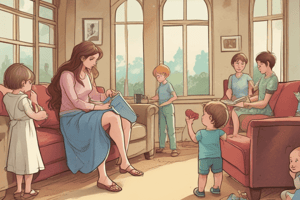Podcast
Questions and Answers
What are the two dimensions of parenting discussed in the text?
What are the two dimensions of parenting discussed in the text?
- Warmth and Emotional Manipulation
- Psychological Control and Behavioural Control (correct)
- Responsiveness and Authoritarianism
- Control and Rules
Which parenting style is associated with children being more responsible, self-disciplined, and prosocial?
Which parenting style is associated with children being more responsible, self-disciplined, and prosocial?
- Permissive
- Authoritarian
- Uninvolved
- Authoritative (correct)
Which parenting style is described as having lots of anger, leading to low self-esteem in children according to the text?
Which parenting style is described as having lots of anger, leading to low self-esteem in children according to the text?
- Uninvolved
- Authoritative
- Permissive
- Authoritarian (correct)
Which parental behavior involves not just giving instructions but also providing emotional information to children?
Which parental behavior involves not just giving instructions but also providing emotional information to children?
What does negative reinforcement involve?
What does negative reinforcement involve?
In which type of reinforcement does the behavior increase because the child knows that sometimes it works?
In which type of reinforcement does the behavior increase because the child knows that sometimes it works?
What is the main purpose of punishment according to the text?
What is the main purpose of punishment according to the text?
Which parental response leads to children seeing punishment as more of a correction rather than a personal attack?
Which parental response leads to children seeing punishment as more of a correction rather than a personal attack?
What is the purpose of 'time-out' as a disciplinary technique?
What is the purpose of 'time-out' as a disciplinary technique?
How does parental conflict primarily affect children, according to the text?
How does parental conflict primarily affect children, according to the text?
Study Notes
The Family System
- Members of the family exert mutual influence over each other
- The family unit is influenced by outside forces
- The influence of family on development is dynamic and multidimensional
Dimensions of Parenting
- Two dimensions of parenting: warmth and responsiveness, and control
- Warmth and responsiveness refers to either caring or not caring
- Control refers to either controlling everything or nothing
- Psychological control involves control through manipulation
- Behavioural control involves control through rules and limits
- Children in Canada tend to do better with parents who are highly warm and moderately controlling
Parenting Styles
- Authoritarian: high control, low warmth, leading to unhappy, angry children with low self-esteem
- Authoritative: moderate control, high warmth, leading to responsible, self-disciplined, independent, and socially skilled children
- Permissive: low control, high warmth, leading to impulsive children with difficulty regulating emotions
- Uninvolved: low control, low warmth, leading to angry and aggressive children with issues with delayed gratification and coping skills
- Traditional: high control, high warmth, often seen in certain cultures and individuals
- Lower socioeconomic status families tend to exert more control, while educated parents tend to gravitate towards authoritative style
Parental Behaviours
- Direct instruction involves not just instruction but also emotional information, leading to better social skills in children
- Observational learning/modelling involves children learning from parents' behaviour, such as inviting others to play
- Counter-imitation involves learning not to do certain things and learning from the consequences of others' actions
- Feedback involves reinforcement, negative reinforcement, intermittent reinforcement, and punishment
- Reinforcement involves rewarding desired behaviour
- Negative reinforcement involves removing something unpleasant
- Intermittent reinforcement involves not always rewarding desired behaviour, leading to increased behaviour
- Punishment involves giving consequences, such as chores or taking away privileges
- Punishment should be immediate, accompanied by explanation and suggestions for improvement
- Extreme discipline is ineffective and can lead to substance abuse and depression
Influence of the Marital Relationship
- Parental conflict makes children feel anxious, withdrawn, and sometimes angry
- Some children may learn conflict behaviours from their parents
Studying That Suits You
Use AI to generate personalized quizzes and flashcards to suit your learning preferences.
Description
Test your knowledge on the family system dynamics, mutual influence among family members, external influences, and the dimensions of parenting including warmth/responsiveness, control, psychological control, and behavioral control.





